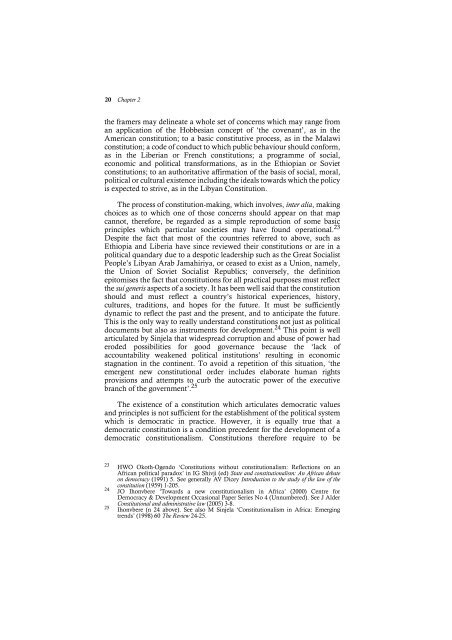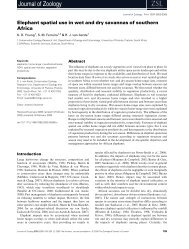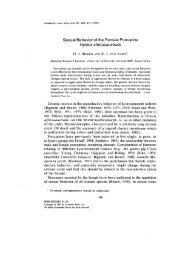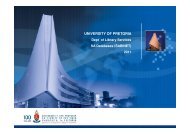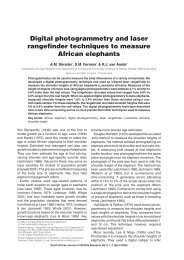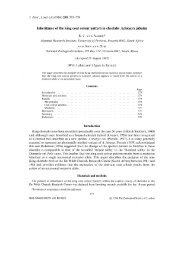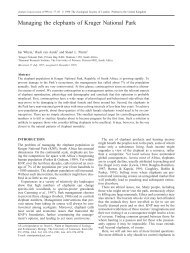- Page 1 and 2: Constitutionalism and Democratic Go
- Page 3 and 4: TABLE OF CONTENTS FOREWORD AND DEDI
- Page 5 and 6: 5 6 7 4.1 The eagerness to write ye
- Page 7 and 8: 11 12 13 3 Main features of the 199
- Page 9 and 10: FOREWORD AND DEDICATION Adieu, Stev
- Page 11 and 12: His analysis in the article deals i
- Page 13 and 14: In loving memory of our beloved dep
- Page 15 and 16: human rights law. He is also an ass
- Page 17 and 18: Constitutional Law, Human Rights, G
- Page 19: PART I: GENERAL THEORETICAL PERSPEC
- Page 22 and 23: 4 Chapter 1 political activities of
- Page 24 and 25: 6 Chapter 1 other arms. Disquiet wi
- Page 26 and 27: 8 Chapter 1 institutions it establi
- Page 28 and 29: 10 Chapter 1 case of Botswana’, t
- Page 30 and 31: 12 Chapter 1 constitutional culture
- Page 33 and 34: CHAPTER 2 TANZANIA’S EXPERIENCE W
- Page 35 and 36: Tanzania’s experience with consti
- Page 37: Tanzania’s experience with consti
- Page 41 and 42: Tanzania’s experience with consti
- Page 43 and 44: Tanzania’s experience with consti
- Page 45 and 46: Tanzania’s experience with consti
- Page 47 and 48: Tanzania’s experience with consti
- Page 49 and 50: Tanzania’s experience with consti
- Page 51 and 52: Tanzania’s experience with consti
- Page 53 and 54: Tanzania’s experience with consti
- Page 55 and 56: Tanzania’s experience with consti
- Page 57 and 58: Tanzania’s experience with consti
- Page 59 and 60: Tanzania’s experience with consti
- Page 61 and 62: Tanzania’s experience with consti
- Page 63 and 64: Tanzania’s experience with consti
- Page 65 and 66: Tanzania’s experience with consti
- Page 67 and 68: Tanzania’s experience with consti
- Page 69 and 70: CHAPTER 3 FROM THE ‘TPLF CONSTITU
- Page 71 and 72: Ethiopia: Constitutionalism and pro
- Page 73 and 74: Ethiopia: Constitutionalism and pro
- Page 75 and 76: Ethiopia: Constitutionalism and pro
- Page 77 and 78: Ethiopia: Constitutionalism and pro
- Page 79 and 80: Ethiopia: Constitutionalism and pro
- Page 81 and 82: Ethiopia: Constitutionalism and pro
- Page 83 and 84: Ethiopia: Constitutionalism and pro
- Page 85 and 86: Ethiopia: Constitutionalism and pro
- Page 87 and 88: Ethiopia: Constitutionalism and pro
- Page 89 and 90:
Ethiopia: Constitutionalism and pro
- Page 91 and 92:
Ethiopia: Constitutionalism and pro
- Page 93 and 94:
Ethiopia: Constitutionalism and pro
- Page 95 and 96:
Ethiopia: Constitutionalism and pro
- Page 97 and 98:
Ethiopia: Constitutionalism and pro
- Page 99 and 100:
Ethiopia: Constitutionalism and pro
- Page 101 and 102:
Ethiopia: Constitutionalism and pro
- Page 103 and 104:
Ethiopia: Constitutionalism and pro
- Page 105:
Ethiopia: Constitutionalism and pro
- Page 108 and 109:
90 Chapter 4 There is consensus on
- Page 110 and 111:
92 Chapter 4 The final determinatio
- Page 112 and 113:
94 Chapter 4 seriously, and quickly
- Page 114 and 115:
96 Chapter 4 United Nations General
- Page 116 and 117:
98 Chapter 4 territory in return fo
- Page 118 and 119:
100 Chapter 4 The UN Commissioner o
- Page 120 and 121:
102 Chapter 4 provisions’. 75 The
- Page 122 and 123:
104 Chapter 4 According to Selassie
- Page 124 and 125:
106 Chapter 4 argued that the immed
- Page 126 and 127:
108 Chapter 4 roadmap is understood
- Page 128 and 129:
110 Chapter 4 be amended and where,
- Page 130 and 131:
112 Chapter 4 According to the Erit
- Page 132 and 133:
114 Chapter 4 5 Conclusion The UN w
- Page 134 and 135:
116 Chapter 5 makes the state a dom
- Page 136 and 137:
118 Chapter 5 Except as may be othe
- Page 138 and 139:
120 Chapter 5 The extent of article
- Page 140 and 141:
122 Chapter 5 law consistent with t
- Page 142 and 143:
124 Chapter 5 the idea of constitut
- Page 144 and 145:
126 Chapter 5 3 The 1992 Constituti
- Page 146 and 147:
128 Chapter 5 This provision came u
- Page 148 and 149:
130 Chapter 5 December Case) 32 and
- Page 150 and 151:
132 Chapter 5 local government bodi
- Page 152 and 153:
134 Chapter 5 5 Conclusion The sear
- Page 154 and 155:
136 Chapter 6 altered, 3 three sect
- Page 156 and 157:
138 Chapter 6 The 1960 Constitution
- Page 158 and 159:
140 Chapter 6 though from different
- Page 160 and 161:
142 Chapter 6 the downfall of the f
- Page 162 and 163:
144 Chapter 6 February 1976. 47 The
- Page 164 and 165:
146 Chapter 6 While the Preamble of
- Page 166 and 167:
148 Chapter 6 are within the exclus
- Page 168 and 169:
150 Chapter 6 grounds for an aggrie
- Page 170 and 171:
152 Chapter 6 The 1979 Constitution
- Page 172 and 173:
154 Chapter 6 announcement of the e
- Page 174 and 175:
156 Chapter 6 The sixth Preamble of
- Page 176 and 177:
158 Chapter 6 interest to note that
- Page 178 and 179:
160 Chapter 6 AND WHEREAS the milit
- Page 180 and 181:
162 Chapter 6 independence of both
- Page 182 and 183:
164 Chapter 7 annexing their territ
- Page 184 and 185:
166 Chapter 7 The British administe
- Page 186 and 187:
168 Chapter 7 two Cameroons and com
- Page 188 and 189:
170 Chapter 7 of political activism
- Page 190 and 191:
172 Chapter 7 3 An analysis of cons
- Page 192 and 193:
174 Chapter 7 (h) Law of Public Pro
- Page 194 and 195:
176 Chapter 7 issue before a court
- Page 196 and 197:
178 Chapter 7 30 December 1961, ele
- Page 198 and 199:
180 Chapter 7 legislature because t
- Page 200 and 201:
182 Chapter 7 3.3 The 1996 Constitu
- Page 202 and 203:
184 Chapter 7 President of the Repu
- Page 204 and 205:
186 Chapter 7 3.3.4 Bill of Rights
- Page 206 and 207:
188 Chapter 7 criticisms have led t
- Page 209 and 210:
CHAPTER 8 PRE-INDEPENDENCE CONSTITU
- Page 211 and 212:
Pre-independence constitutions: The
- Page 213 and 214:
Pre-independence constitutions: The
- Page 215 and 216:
Pre-independence constitutions: The
- Page 217 and 218:
Pre-independence constitutions: The
- Page 219 and 220:
Pre-independence constitutions: The
- Page 221 and 222:
Pre-independence constitutions: The
- Page 223 and 224:
Pre-independence constitutions: The
- Page 225 and 226:
Pre-independence constitutions: The
- Page 227 and 228:
Pre-independence constitutions: The
- Page 229 and 230:
Pre-independence constitutions: The
- Page 231 and 232:
Pre-independence constitutions: The
- Page 233 and 234:
Pre-independence constitutions: The
- Page 235:
Pre-independence constitutions: The
- Page 238 and 239:
220 Chapter 9 which the Independenc
- Page 240 and 241:
222 Chapter 9 2.1 Making a ‘perfe
- Page 242 and 243:
224 Chapter 9 constitution that is
- Page 244 and 245:
226 Chapter 9 shaped by the content
- Page 246 and 247:
228 Chapter 9 views of a broad cros
- Page 248 and 249:
230 Chapter 9 Constitutional Confer
- Page 250 and 251:
232 Chapter 9 Constitution. 69 As e
- Page 252 and 253:
234 Chapter 9 stitutionalism in Mal
- Page 254 and 255:
236 Chapter 9 Conference was ‘uni
- Page 256 and 257:
238 Chapter 9 a new constitution. T
- Page 258 and 259:
240 Chapter 9 There is no doubt tha
- Page 260 and 261:
242 Chapter 9 At the same time, it
- Page 263 and 264:
CHAPTER 101990 CONSTITUTION OF BENI
- Page 265 and 266:
Twenty years of practice and the di
- Page 267 and 268:
Twenty years of practice and the di
- Page 269 and 270:
Twenty years of practice and the di
- Page 271 and 272:
Twenty years of practice and the di
- Page 273 and 274:
Twenty years of practice and the di
- Page 275 and 276:
Twenty years of practice and the di
- Page 277 and 278:
Twenty years of practice and the di
- Page 279 and 280:
Twenty years of practice and the di
- Page 281 and 282:
Twenty years of practice and the di
- Page 283 and 284:
Twenty years of practice and the di
- Page 285 and 286:
Twenty years of practice and the di
- Page 287 and 288:
Twenty years of practice and the di
- Page 289 and 290:
Twenty years of practice and the di
- Page 291 and 292:
Twenty years of practice and the di
- Page 293 and 294:
Twenty years of practice and the di
- Page 295 and 296:
Twenty years of practice and the di
- Page 297 and 298:
Twenty years of practice and the di
- Page 299 and 300:
Twenty years of practice and the di
- Page 301 and 302:
Twenty years of practice and the di
- Page 303 and 304:
Twenty years of practice and the di
- Page 305 and 306:
Twenty years of practice and the di
- Page 307 and 308:
Twenty years of practice and the di
- Page 309 and 310:
CHAPTER 1 Christopher FROM MILITARY
- Page 311 and 312:
From military rule and no party sta
- Page 313 and 314:
From military rule and no party sta
- Page 315 and 316:
From military rule and no party sta
- Page 317 and 318:
From military rule and no party sta
- Page 319 and 320:
From military rule and no party sta
- Page 321 and 322:
From military rule and no party sta
- Page 323 and 324:
From military rule and no party sta
- Page 325 and 326:
From military rule and no party sta
- Page 327 and 328:
From military rule and no party sta
- Page 329 and 330:
From military rule and no party sta
- Page 331 and 332:
From military rule and no party sta
- Page 333 and 334:
CHAPTER 12 CONSTITUTIONAL GOVERNANC
- Page 335 and 336:
Constitutional governance, democrat
- Page 337 and 338:
Constitutional governance, democrat
- Page 339 and 340:
Constitutional governance, democrat
- Page 341 and 342:
Constitutional governance, democrat
- Page 343 and 344:
Constitutional governance, democrat
- Page 345 and 346:
Constitutional governance, democrat
- Page 347 and 348:
Constitutional governance, democrat
- Page 349 and 350:
Constitutional governance, democrat
- Page 351 and 352:
Constitutional governance, democrat
- Page 353:
Constitutional governance, democrat
- Page 356 and 357:
338 Chapter 13 for his vice preside
- Page 358 and 359:
340 Chapter 13 that the organisatio
- Page 360 and 361:
342 Chapter 13 The attempts made by
- Page 362 and 363:
344 Chapter 13 the Public Officers
- Page 364 and 365:
346 Chapter 13 of people, which cha
- Page 366 and 367:
348 Chapter 13 We should cease maki
- Page 368 and 369:
350 Chapter 13 democracy is the pri
- Page 370 and 371:
352 Chapter 13 than 1 200 criminals
- Page 372 and 373:
354 Chapter 13 the political will t
- Page 374 and 375:
356 Bibliography Buchanan, A (2003)
- Page 376 and 377:
358 Bibliography Ngoh, VJ (1990) Co
- Page 378 and 379:
360 Bibliography Ahanhanzo-Glèlè,
- Page 380 and 381:
362 Bibliography Le Vine, VT ‘Pol
- Page 382 and 383:
364 Bibliography Abimbola, A ‘Pre
- Page 384 and 385:
366 Bibliography Fombad, C ‘The n
- Page 386 and 387:
368 Bibliography Lewis, P ‘From p
- Page 388 and 389:
370 Bibliography Salami, I ‘La mo
- Page 390 and 391:
372 Bibliography /www.venice.coe.in
- Page 392 and 393:
374 Bibliography dex.php/actualite/
- Page 394 and 395:
376 Bibliography Law no 2010/005 of


